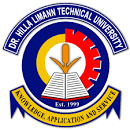OUR HISTORY:
OUR VISION:
OUR MISSION:
OUR MANDATE:
OUR CORE VALUES:
NICHE AREA:
Dr. Hilla Limann Technical University (DHLTU), located in Wa started in September 1999 as the then Wa Polytechnic. However, it was not until 2002 that the interim Governing Council was appointed by Government to provide policy direction to the Institution. The first batch of tertiary students was admitted in 2003 to pursue Higher
National Diploma (HND) programmes in Agricultural Engineering and Secretaryship and Management Studies.
Following the passing of the Technical Universities Act, 2016 (Act 922), the Technical Universities (Amendment) Act 2018 (Act 974) and the Technical Universities (Amendment) Act 2020 (Act 1016), the institution was converted to a Technical University in 2020 to award its own degrees, diplomas and other qualications on the directions and approval by the DHLTU Governing Council.
Currently, the University runs seven (7) Bachelor of Technology Programmes accredited by GTEC and fourteen (14) HND programmes accredited by CTVET (see details on website: www.dhltu.edu.gh) and other competitive short courses and programmes. Graduate programmes are also being developed to be introduced soon.
To become a world class centre for applied science and technology and applied arts to provide career-focused education for rural poverty reduction and national development.
To become a leader in providing courses in a variety of subject areas using competency-based learning, especially in the engineering, applied science and technology and management to meet the needs of business, industry, the service sector and society at large.
The laws establishing the University are the Technical Universities Act, 2016 (Act 922); the Technical University (Amendment) Act 2018 (Act 974) and the Technical University (Amendment) Act 2020 (Act 1016). The University’s mandate as deined by the law is to: 13DHLTU – 4TH CONGREGATION REPORT, JUNE 2023
1. Provide tertiary education through full time courses in the field of Manufacturing, Commerce, Science, Applied Arts and such other areas as may be determined by the authority responsible for higher education.
2. Encourage study in technical subjects at tertiary level
3. Provides opportunity for life-long development, research and publication of research findings
4. Provide opportunities for life-long learning based on industry and community demands
The University is supervised by the Ghana Tertiary Education Commission (GTEC), governed by the University Council and funded by the state and the Ghana Education Trust Fund (GETFund).
· Quality
· Equity
· Transparency
· Team spirit
· Innovativeness
· Environmental sustainability
The Niche Area of the University is Industrial Art.
